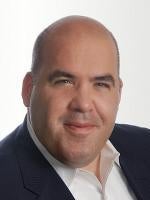Welcome and thank you for joining us for this special edition of We get work™, live from Jackson Lewis’ Workplace Horizons 2024 from the Lotte New York Palace in New York City and the Wynn in Las Vegas. What follows are high level conversations on conference programs and why they were important topics to present now.
Transcript
Welcome and thank you for joining us for this special edition of We get work™, live from Jackson Lewis’ 2024 Workplace Horizons Conference. What follows are high-level conversations, providing information on conference programs and in light of the current legal, regulatory and cultural landscape, why they were important topics to present now.
Patty Pryor provides the latest information on religious accommodations in light of last year’s Supreme Court decision in Groff v. DeJoy. Joe Lynett and Joe DiPalma look at the technical side of accommodations compliance in implementing AI workplace tools that are both accessible and accommodating. Michelle Phillips and special guest Rob Falk of the Truth Initiative remind employers to take gender inclusion beyond pronouns into account. And Felice Ekelman and Laura Mitchell continue the discussion around the evolution of ESG, navigating the tide of change.
This afternoon, we’re talking to Patty Pryor, principal in our Cincinnati office and a member of the firm’s Disability Leave and Health Management Practice Group. Good afternoon, Patty. Can you tell us a little bit about yourself and your practice at Jackson Lewis?
Sure. So I’m Patty Pryor and I am out of the Cincinnati office. And we do a lot of work helping employers deal with all kinds of accommodations, not just disability anymore, but pregnancy and now religious.
Your presentation at the conference focused on religious accommodations in our ever popular Speed Round series. Can you provide our listeners with a brief summary of what you covered and why it was important to present this topic at Workplace Horizons this year?
I think as a lot of employers have noticed over the last couple of years, religious accommodation requests have exploded, as has litigation surrounding those. I think we talked last year when we were at this, we talked about that explosion and how it was caused in part by COVID and the vaccine mandates. This year it’s increased even more because we had the Groff Supreme Court decision last summer, which has significantly impacted what employers need to do and the challenges that they face. Everything has become more challenging. And I think one of the biggest problems with religious accommodation requests, unlike other ones where, for example, pregnancy, you can tell if someone’s pregnant or not. With a disability, you can get a doctor’s note. With the religious accommodation requests, you don’t have any proof. You can’t really get that pastor’s note necessarily. The employee doesn’t have to have a pastor that supports it. The employee doesn’t have to have an organized religion behind it. It is so personal and individualized that I think sometimes employers are left scratching their head of, is this real? Is this legitimate? How do we make sure we’re not getting scammed in the process?
Patty, what were some of the issues that really resonated with our attendees during your presentation? What did they really want and need to know?
I think like with everything, they want to know the practical of what do we do about it? And how do we address that? And so it’s really kind of helping them identify the issues, be prepared for the issues, and making sure they can help train their managers and supervisors to be prepared. So they don’t have an individual ask for a request that may sound off the wall, may sound different than what someone’s used to, and you have a manager or supervisor say something in response to it that initially creates an issue before we even get down the road of the accommodation.
So with that in mind, what are some of the key takeaways that you shared with our attendees and that you’d like to share with our listening audience?
I think first and foremost is take a breath and listen. Listen to the employee, even if the request may sound, you know, something that you’re not familiar with, a religion that you’ve never heard of, a religious practice you’ve never seen. Don’t prejudge anything. And actually listen to it. And oftentimes with most of these accommodation requests, it really comes down to just good employee relations.
So it’s not so much necessarily, I think if you get too hung up on the religious aspect of it, is it true, is it not, you miss the other aspect of it of what can we do as an employer to have good employee relations and is there a way that we can assist or accommodate the individual that doesn’t put us into a bind but gets the point across with the employee and helps the employee become a better employee.
You mentioned the Groff case. Would you say that’s the most significant development that’s happened since we were together last year? Or has that decision created other significant developments that you’d like to discuss?
I think it’s absolutely the Groff decision last summer is the biggest significant change since when we were together last year. We expected it. I think last year we just witnessed the oral arguments right before our conference. And this year, it’s come to pass. There’s a lot still to unpack with that. With all the Supreme Court decisions, there’s always, they give you just a little bit of a nugget, a little bit of a flavor to test on. And then since then, it’s the litigation surrounding that. And what does that really mean? And we’re continuing. We do both the advice for employers on it, but we also do the litigation when things don’t go as well as we planned.
OK, so religious accommodations, a very challenging issue. In addition to that, what other accommodations issues are challenging employers in 2024?
I think all accommodations, all accommodation requests are challenging, right? Because every accommodation request is the employee asking for something different than what the employer already provides. And all of us, we get set in our ways and we think our way is the right way. And so anytime you get an accommodation request, it’s a challenge for the employers. We’re used to, I think employers have become used to the ADA or the disability accommodation requests. We now have this year the PWFA, the pregnancy accommodation request on top of that, and then the explosion of the religious, it really is so easy for employees to ask for more. Everyone wants more, everyone wants it done their way. And I think for employers, it just becomes more challenging. And so it’s finding a happy medium of how are we going to address them and how can we, practically speaking, make it work for us and the employees and move on together.
Patty, thank you so much. And we’ll look forward to sitting together next year where we’ll see where this issue has landed and how employers are dealing with all of the challenges. Thank you.
Today we’re talking to Joe DiPalma and Joe Lynett, principals in the White Plains and New York City offices of Jackson Lewis. Good afternoon, Joe and Joe. Can you each tell me a little bit about your practice and how you serve our Jackson Lewis customers?
Joe DiPalma. Hey, thank you for having me. Like you said, I’m a partner in our White Plains office. I do day-to-day advice and counsel and litigate. I have a specialty area in disability leave health management issues. And I actually also have a fairly large ADA Title III practice as well.
Thank you. Joe Lynett.
Thank you. I co-lead the firm’s Disability Leave and Health Management group at Jackson Lewis. And I also lead the firm’s disability access litigation and counseling group, which defends and advises companies on disability discrimination claims lodged by consumers.
Thanks. Joe L, sticking with you for a moment. The title of your presentation today was Implementing AI Workplace Tools That Are Both Accessible and Accommodating. Can you provide our listeners with a brief summary of what was covered in your presentation and why it was important to present this topic at Workplace Horizons?
The presentation really focused on the EEOC’s AI Fairness Initiative, which is really designed to educate employers on how the use of AI software and algorithms could potentially violate the civil rights laws that the EEOC enforces. The reason it was important is that this has been a priority of the EEOC. The EEOC identified AI in their strategic enforcement plan for the next five years as a focus.
And what do you think some of the issues that really resonated with our attendees during your presentation?
The main issue is really the lack of law in this area and the underdeveloped application of the use of AI to the federal civil rights laws. We’re really operating in an area that is a new frontier. And the concern I think that a lot of the attendees had was, well, how are we supposed to comply? What sensible procedures can we adopt or should be thinking about in the absence of real cases?
Joe D, were there other concerns that were addressed or questions that were raised during the presentation? What did the attendees really want to know?
Right. So to piggyback off of what Joe just said, this is an undeveloped area of the law and not everyone knows what to do when confronted with these types of issues. So I think the big concern is in the first instance, recognizing what the issue is that there is an issue to be had. And when you think about AI and the use of these tools, they’re being developed by vendors that we have no control over. So it’s really trying to grasp on what these programs are, how do these algorithms work, and how do they impact the employment decisions that are being made. So a lot of the questions were really addressed to how to deal with that, how to communicate with the vendors, and how to figure out the best path forward for their operation.
Joe D, what do you believe to be some of the key takeaways? I mean, AI is such a huge topic right now. What are some of the key takeaways employers should keep in mind when addressing these issues in their organizations?
Sure. I mean, so we spoke about AI a lot, and this presentation was specifically using AI as it relates to accessibility and accommodation issues. And I think it’s important for employers to understand that AI is just another tool to use and it’s not the ultimate decision maker. The employer is still going to be held liable for any decisions that were incorrect by AI. So knowing that it’s just a tool and you can use it to streamline processes and procedures is helpful, but you still need that human element to vet it and make sure that everything is done above board to make sure you don’t end up on the wrong side of a lawsuit.
Right, exactly. Joe L, since we were together at last year’s conference, what do you think has been the most significant development affecting employers on this topic?
Vice Chair Samuels really mentioned it yesterday during her remarks, which is that the EEOC is focused on how AI and the use of AI and other automated employment decision tools can potentially run afoul of the federal civil rights laws that the agency enforces. So it is a priority for the EEOC employers I think are aware now, these two attended this conference, that this is a priority for the EEOC. And that’s been a significant change. When the EEOC goes on the record in public stating that an area of focus, it gets the employer community focused.
Okay. One last question, Joe. How else or how is Jackson Lewis providing assistance to organizations on these issues?
Well, Jackson Lewis has a dedicated team, task force on AI that brings together attorneys throughout Jackson Lewis that have a different focus, OFCCP, my practice area Disability Management, to bring together a variety of perspectives and experience on how AI impacts employers in different facets of their employee relations.
Joe, thank you so much for stopping by and stepping behind the podcast mic for us today at Workplace Horizons. We hope you enjoy the rest of the conference. Thank you.
This afternoon, we’re talking to Michelle Phillips, principal in the White Plains Office of Jackson Lewis, and our special guest, Rob Falk from the Truth Initiative. Thank you both for joining us this afternoon. Can you please each introduce yourselves and tell us a little bit about what you do?
Sure. I’m Michelle Phillips. I’m in the White Plains office of Jackson Lewis. And within Jackson Lewis, I’ve had the sheer pleasure and opportunity to be one of the nation’s experts in LGBTQ plus issues. And I write about it, blog about it, conduct trainings on it and do presentations like here at The Wynn.
Hi, I’m Rob Falk, Chief Legal Officer for the Truth Initiative. We’re a youth facing tobacco and vaping prevention and cessation program based in Washington, D.C., but operating all across the country.
Michelle, the title of the presentation this afternoon was Gender Inclusion Beyond Pronouns. Can you tell our listeners a little bit about your topic and why it was important to present this year at Workplace Horizons?
You know, the title is, I didn’t come up with it, but it’s a brilliant title, right? Because where our minds go in the binary is around the pronouns, right? So when we talk about beyond, that’s really what we were talking about in today’s program. And we’re really looking at best practices, compliance with both federal, state, and municipality laws, and what tools can we give to our clients to enable them to do a better job, right? And the other thing we talked about is this tension between the increase of religious freedoms and religious rights and how that interconnects with LGBTQ plus rights.
Rob, how do you approach this issue of tension in the in-house environment?
So for those of us who are in-house practitioners, we’re facing risk every day. And this is sometimes perceived as competing interests. So when I think about it, I like to think about leading from kindness because really I have to be thinking about.
What incentives am I creating for the well-intentioned, well-performing employee in the future? And what they want to see from us as leaders is kindness. And so sometimes we have to get into uncomfortable spaces where we are not exactly clear what we’re doing in order to show kindness to our employees. And that’s what my view of leadership is.
Thank you, Rob. And thank you for your kindness. Michelle? What were some of the issues that resonated with our attendees today? What did they want to know?
One of the things that was most interesting to me is all the questions. These are in-house employment council and HR professionals, and they have a quest for knowledge. They don’t want to mess up. They don’t want to be unkind. They want to know what is gender identity? What is gender expression? What’s the difference between AGAB, AFAB and AMAB, right? So, Assigned Male at Birth, Assigned Female at Birth, Assigned Gender at Birth. Why is that important? What is deadnaming, right? You know, what does it mean to misgender someone? And, you know, that quest for getting it right, you know, for understanding, someone’s transitioning. What does that mean? Like, is that a biological thing? Is it about medical surgeries? Is it about the way someone consistently presents? And I would say the question we got the most was about the restroom issue. And how do we deal with these, again, these competing rights, right? People will say, well, why do I have to be uncomfortable? Why do I have to be in a bathroom with people I’m uncomfortable about? And what we talked about in the training and the presentation today is that restroom usage is based on consistent gender presentation. And if someone’s uncomfortable being in the restroom with someone else for any reason, then they just have to simply go to another restroom. So those are probably the most compelling issues.
And so our audience wants to know what is, how can they be compliant, but also how do they answer these recalcitrant questions that they’re getting in the workplace? So Rob, understanding that employers really want to do their best to meet these issues in order to be compliant and to make their employees feel comfortable. What are some of the key takeaways you would suggest for our listeners and our attendees here at the conference?
So I think gender identity, gender expression is another opportunity for allyship. And so that may require for us to do some learning, right? We may have to learn terminology and whatnot, but we are part of a learning community. We came to this conference to learn about this issue and other issues. So let’s take the time to educate ourselves. And then let’s put into place plans for what happens in our workplace when somebody transitions when questions come up.
It’s the pre-planning that helps you be successful and then understanding if you have an employee who transitions in the workplace, you’ve done one, you’ve done one. Kindness requires you to work with the employee to figure out what that person is comfortable with and what will be successful for them. And also being kind to the other employees who may not yet understand what this person is going through or how to interact with them and supporting both those sets of people understanding that from a legal compliance perspective, you have to protect the employee who is protected under law.
So Michelle, other than having Rob here at Workplace Horizons talk about these issues, how else is Jackson Lewis helping employers across all types of organizations deal with these issues?
Well, many of us regularly conduct training that educates people within the workplace. We do that in legal seminars. We do that in trainings for organizations, both nonprofit and for-profit. You know, I regularly write articles, you know, during the month of pride is a great opportunity to demonstrate allyship within the community and to, you know, to bring in people like Rob and I. We’ve actually co-presented before, you know, during the month of pride where we’ve done podcasts together. There’s just so many different opportunities.
We also look at policies, make sure the policies are compliant in the different states. We look at various states have training requirements, particular California and New York, for example, have very specific training requirements in this area. So we can either do the training or we can vet the training for others. It also could be in the context of an investigation. Like I’ve had investigations where the complainant is non-binary or trans. So you need to have a sensitivity when you’re conducting these investigations. So sometimes I’ll conduct the investigation. Sometimes I’ll be behind the scenes assisting the interviewer with the appropriate term, like how do you address the person? What do you say? You know, it’s also in the context of litigation. Of course, we defend employers in these cases. But I’ll give you an example. I was doing taking the deposition of someone who’s non-binary. Usually you would start with Mr. or Miss. What do you say if someone’s non-binary? You say mix, right? There’s ways that we demonstrate our knowledge and, you know, that helps our clients. So please, you know, I’m a phone call away, like, or an email or a text. Please do reach out to us.
Michelle, Rob, thank you so much for joining us at the conference and here behind the podcast mic at We get work™. And please enjoy the rest of the conference. Thank you.
This afternoon, we’re talking to Laura Mitchell and Felice Ekelman, principals in the Denver and New York City offices of Jackson Lewis. Can you each give me a little bit about yourself and your practice to get us started? Laura?
Yeah. Hello, I’m Laura Mitchell. I’m a principal in our Denver office. I co-lead our ESG client services group, and I’m a principal in our OFCCP affirmative action group and pay equity groups.
Thank you. Felice.
Hi. I’m a generalist, and I provide a lot of advice to employers on how to be a best in class employer, which is part of this balancing that we’re going to talk about with our discussion of ESG in 2024.
The title of your presentation, Laura, was The Evolution of ESG, Navigating the Tide of Change. Can you provide our listeners with a brief summary of what was covered in your presentation and why it was important to present this topic at Workplace Horizons.
Absolutely. Felice and I had a great conversation with attendees about the tides of change of ESG and really about what hasn’t changed in this space. We’re still talking about a lot of the same concepts that we have been in workplace law for years, non-discrimination, workplace safety. We’re just talking about them in different ways and using different terms.
So our conversation was really a great opportunity for us to educate the attendees on the new subtle changes to what’s going on to ESG and challenges that are facing employers today.
Thank you. Felice, what were some of the issues that resonated with our attendees during your presentation? What did they really want to know?
We talked about how ESG is really a multifaceted approach to ensuring that employers are attentive to the needs of employees and are responsive to the tides of change. So for example, we spent some time talking about workplace safety. What does it mean to create a safe environment for employees? And while the more traditional view might be to look at OSHA-like safety rules. Workplace safety today means an environment where employees are free from harassment, where they are comfortable presenting issues to employers about the workplace, and also to ensure safety from invasions of privacy and cybersecurity issues. And so the group was very engaged in discussing these aspects and a holistic view of what employees saw as what constitutes a safe workplace.
A second issue that we spend some time on is the fact that employees are looking for more out of work than just a job. Employees want to feel good about their employer and the contribution not only they’re making to the employer’s operation, but also that the employer is making contributions to the better good.
Laura?
Yeah, I think we had a great discussion at the outset of the session around the notion that ESG is really values-based governance and organizations need to know who they are, who their corporate identity is in order to have a strong foundation to their ESG program. So just because an issue is someone’s issue doesn’t mean it needs to be your issue. So understanding as an organization what your brand is, what your values are will help you shape a more solid ESG program that will withstand the tests and the tides of time.
So giving all of the issues surrounding ESG in today’s workplace, what do you believe, Laura, are some of the key takeaways employers should keep in mind when addressing these issues in their organizations?
Yeah, that’s a great question. I think the key takeaway that I think of is you’re not going to make everyone happy. And so you have to prepare for pushback and challenge, which means whatever you say, either publicly or that you determine is going to be your policy or your practice, you need to be able to stand behind it, which means you have to explain how you arrived at it, the conclusions that you came to if you’re publishing something in an ESG report or a corporate responsibility report. You need to know what goes into those statements or more importantly, those numbers. And so that you can stand up to those questions around the credibility and the legitimacy of your statements.
Thank you. Felice, since we were together at last year’s Jackson Lewis client conference, what do you believe to be the most significant development affecting employers in this space?
I think it’s the recognition that despite some wins that perhaps are adverse, it’s still important for employers to pay attention to the issues encompassed by an ESG program. And while some employers are abandoning the terminology, they’re not abandoning the goals. Because the goals and being a better employer is a goal that still exists. It should be top of mind for employers as they try to retain and recruit talent because this is an issue that employers face in every industry.
Laura, how else is Jackson Lewis providing assistance to organizations on these issues?
Right. The legal landscape is changing every day in this space. And because ESG is a cross-practice initiative, there’s a lot of things happening all over the place. So we are continuing to monitor legal developments, compliance developments. For example, we’re expecting SEC guidelines here on human capital management sometime in the near future. So we continue to monitor, digest, and report out with our insights and things to watch for clients and others to take advantage of.
Laura, Felice, thank you so much for joining us from the Workplace Horizons podcast microphone today. And we hope you enjoy the rest of the conference. Thanks, you as well.
Thank you for joining us on We get work™. Please tune into our next program where we will continue to tell you not only what’s legal, but what is effective. We get work™ is available to stream and subscribe on Apple podcasts, Google podcasts, Libsyn, Pandora, SoundCloud, Spotify, Stitcher, and YouTube. For more information on today’s topic, our presenters, and other Jackson Lewis resources, visit JacksonLewis.com. As a reminder, this material is provided for informational purposes only. It is not intended to constitute legal advice, nor does it create a client lawyer relationship between Jackson Lewis and any recipient.









 />i
/>i

